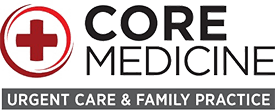 If your New Year’s resolution revolves around taking better care of your body, Core Medicine of Idaho could help gauge your baseline with a health screening. Unlike most laboratory tests and diagnostic procedures, health screenings help you identify the warning signs of serious health conditions early, giving you a chance to seek treatment before showing symptoms.
If your New Year’s resolution revolves around taking better care of your body, Core Medicine of Idaho could help gauge your baseline with a health screening. Unlike most laboratory tests and diagnostic procedures, health screenings help you identify the warning signs of serious health conditions early, giving you a chance to seek treatment before showing symptoms.
Although health screenings are critical in assessing and addressing your unique health needs, not everyone should take the exact same tests. Read more to learn about what sorts of urgent care health screenings you should consider booking, or contact us today to request an appointment with our family medicine practice.
Table of Contents
Health Screenings Help You Protect Your Body and Mind from Invisible Injuries
Everyone has different needs when it comes to health screenings.
Before recommending a specific screening, a member of our team will typically review your medical history and assess your general risk factors. These risk factors vary, but they usually include your:
- Age
- Gender and sex
- Family health history
- Pre-existing medical conditions
- Lifestyle factors, like your diet and how often you get exercise
Age and sex are often two of the most significant risk factors for different health conditions.
Even if you feel 100% healthy and fit, your provider may recommend getting screened for conditions common among people in your age range and with a similar risk profile.
The Different Types of Health Screenings at a Caldwell Urgent Care Clinic
We can’t tell you which screenings you may need without seeing you.
However, certain types of tests and health screenings are regularly recommended for all men and women within the same age range. Here are some of the most common kinds of health screenings that we offer:
STI Tests and STD Screenings
If you’re sexually active and you haven’t been tested for sexually transmitted diseases in the recent past, you may need a screening to make sure that you haven’t been exposed to infection.
Most STI screenings are simple procedures that require samples of blood, urine, or both. You can usually get your results back within several days.
Mammograms and Pap Smears
Medical providers recommend that women receive semi-regular pap smears, or pap tests, after they turn 21. Pap smears help catch cervical cancer early, when it’s still in its initial stages and easiest to treat.
If you’re a woman over the age of 40, your family medicine provider may also recommend getting a mammogram at least once every one to two years.
Blood Pressure Screenings
A blood pressure screening measures the pressure in your arteries.
If you ever visit urgent care to speak to a provider or receive a routine physical, you’ll usually receive a blood pressure screening. However, we may recommend additional tests if you have specific concerns about your blood pressure or heart.
Cholesterol Level Tests
A cholesterol test, or lipid panel, measures the amount of cholesterol and triglycerides in your blood. Even if your cholesterol levels are normal, regular screenings can help lower your long-term risk of suffering a heart attack.
Cardiovascular Health Checkups
A heart screening is a comprehensive test of your heart’s health. It can include other types of screenings, like blood pressure tests and cholesterol checks, and is designed to ensure that your cardiovascular system has what it takes to keep your body in tip-top shape.
Colonoscopies
If you’re a man over the age of 45, you may need to be screened for colon cancer.
Prostate Cancer Screenings
Most men need prostate cancer screenings beginning between the ages of 40 and 50.
Although prostate examinations have a reputation for being uncomfortable, they’re essential in identifying risk factors and signs that you wouldn’t be able to notice without expert analysis.
Diabetes Screenings
Most adults will need to be screened for prediabetes and diabetes beginning in their 30s.
If you have a sedentary lifestyle or a diet that isn’t wholly healthy, you may need to be screened earlier or more regularly. Diabetes tests are often coupled with other screenings.
You Can’t Go Wrong with a Routine Physical
Almost anyone can benefit from a routine physical.
Although some patients with special health needs may require more frequent checkups, medical professionals usually advise healthy children and adults to get a routine physical at least once every year. Sometimes termed “general physicals,” these examinations are a regular and scheduled review of your overall health and fitness.
During a standard physical, a member of our team will help:
- Measure your height and weight
- Check vital signs like your temperature, pulse, and blood pressure
- Look over your medical history and talk through any concerns that you might have
- Review and refill your medications
- Order health screenings appropriate for people of your age, gender, and fitness
If you need a health screening, whether because you’ve reached a certain age or could be at risk for a serious medical condition, we’ll work with you and your schedule to order the tests you need.

